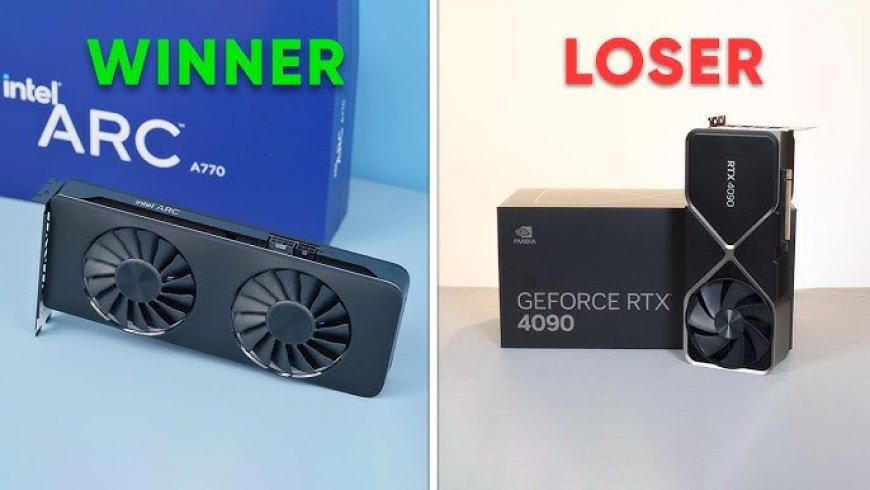Nvidia GeForce RTX 4090 vs. AMD Radeon RX 7900 XTX
The new year brings a fresh GPU comparison between the Nvidia GeForce RTX 4090 and the AMD Radeon RX 7900 XTX, the current generation flagships. While it's a given that the GeForce GPU is faster, the question arises: is it really worth the significant premium price tag of $2,000 compared to the Radeon RX 7900 XTX, which can be acquired for just under $1,000, roughly half the price? In this comprehensive analysis, we'll delve into the details to help you decide.

Setting the Record Straight
Before diving into the comparison, it's important to clarify that the Radeon RX 7900 XTX is more directly in competition with the RTX 4080 rather than the exorbitantly priced RTX 4090. We've previously conducted a detailed comparison between the Radeon 7900 XTX and RTX 4080, covering a range of games with extensive tests in rasterization, ray tracing, and even DLSS vs. FSR upscaling benchmarks. If you're interested in that particular comparison, you can refer to our previous review.
The Origin of the Comparison
The genesis of this comparison stemmed from a reader's question: would it be better to purchase an RTX 4080 or a hypothetical "GTX 4090"? This hypothetical GPU would offer the rasterization performance of the RTX 4090 but be priced like the RTX 4080, lacking tensor cores and RTX features. The debate within our team revolved around whether to opt for the RTX 4080 or the GTX 4090, with the latter potentially being a superior choice for gamers, especially those who predominantly play competitive multiplayer shooters. Surprisingly, a significant number of readers asserted that the GTX 4090 already exists and goes by the name Radeon RX 7900 XTX.
However, in our last assessment, the Radeon 7900 XTX was consistently slower than the RTX 4090 in rasterization performance. Has anything changed since our last review? While it might seem unlikely, several visually stunning games were released late last year, prompting us to conduct an updated comparison.
Also Check Windows 11 2023 Update - Official Release Demo
Test System and Configuration
For our testing, we employed our Ryzen 7 7800X3D test system, equipped with 32 GB of DDR5-6000 CL30 memory. The display drivers used for testing were the Game Ready 546.33 for Nvidia and Adrenalin Edition 23.12.1 for AMD. Now, let's dive into the benchmark results to provide a comprehensive analysis.
Benchmark Results
The Last of Us Part I
In our initial benchmark, featuring the most up-to-date version of The Last of Us Part I, the Radeon RX 7900 XTX exhibited notable performance. It was 23% slower than the RTX 4090 at 1080p, 20% slower at 1440p, and 21% slower at 4K. These results highlight the XTX's strong performance, especially considering its nearly 40% lower price. Additionally, at 4K, it delivered over 60 fps without requiring upscaling.
However, the Achilles' heel for the Radeon GPU in this title is ray tracing. When we activated ray tracing at high settings, performance took a significant hit. At 1080p, it plummeted to 77 fps, making it nearly 50% slower than the RTX 4090. The disparity grew at higher resolutions, with the XTX being 52% slower at 1440p and an astonishing 58% slower at 4K. In essence, the RTX 4090 outperforms the XTX by almost 140% at 4K with ray tracing enabled.
Interestingly, with ray tracing active, the CPU load increased, leading to an unexpected twist. The 7900 XTX managed to offer an 18% performance boost over the RTX 4090 due to the added CPU overhead from the GeForce GPU, causing it to become CPU-limited much earlier. This parity in performance continued even at 1440p, with the results only revealing a GPU-limited scenario when we reached the 4K resolution, where the Radeon GPU lagged behind by a 35% margin.
Marvel's Spider-Man Remastered
Moving on to Marvel's Spider-Man Remastered, a well-optimized title, we encountered an interesting challenge. The game proved so optimized that it pushed our system to a CPU bottleneck even at 1440p. To discern a performance difference between these two GPUs, we had to raise the stakes and test at 4K. Here, the Radeon RX 7900 XTX trailed behind by a 24% margin.


































